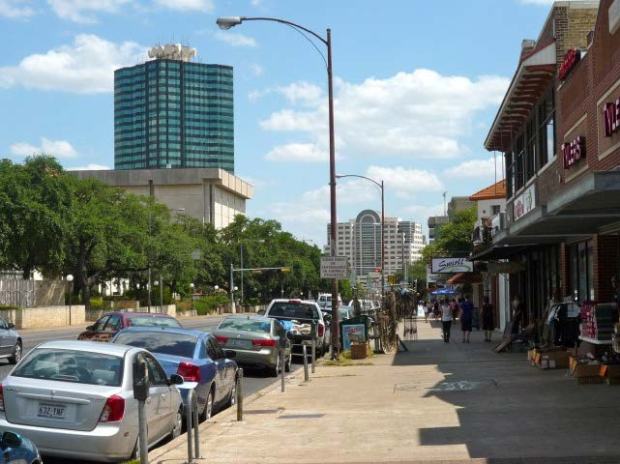 Along UT’s western border of Guadalupe street, homeless people enrich the Drag’s diversity. When Texas furloughs more from Austin’s mental institutions, the Drag gets more weird. If possible.
Along UT’s western border of Guadalupe street, homeless people enrich the Drag’s diversity. When Texas furloughs more from Austin’s mental institutions, the Drag gets more weird. If possible.
In that population, Mary — her name to use and protect her real name — was a queen. She felt younger, washed regularly, and smelled good. Guys loved her or time with her. Rightfully paranoid, she talked to herself rather than imaginary people, and suspected everyone — especially non-homeless people. She carried newspapers and other found objects from the day like a secretary carries important papers next to her bosom. Her accent was somewhere between east Texas and a few missing teeth.
I said “Hi” going to class or work for months. She moved from immediately looking and walking the other way, to stopping and considering, to actually watching me, to half smiling — all in the time it takes to bring an infant to full term. Always discussing me with herself.
One day as I exited the car, loading up to hike to class, I saw Mary across the street. She looked miserable, as if she had been out in the misting night for all of it; sitting on the little concrete wall where she and her closest associates took breaks from pan-handling.
Now, Mary never begged or asked. Things came to her, and this morning looking at her from under my umbrella, I had the impression it was my turn to contribute. I know people who naturally give or give out of their faith. I am guilty of neither. It is hard for me.
I crossed the street gingerly not wanting to spook her, to ask, “Need a lunch?” She looked up, spooked, and trembled.
She responded, “No!” underscoring I had much to learn.
I stopped. She waited. I lied, “Would you please take this lunch for me? I am not going to need it.” She smiled, but did not reach. I stood close enough to offer it. She took it, acknowledging thanks with a nod of her head, completely enwrapped in the paper bag.
I walked off. It warmed up, everyone but Mary shed heavier coats that week, and we all lolled in the sun under any pretext.
The next week, Jill found and risked buying a pair of Nike high tops for eight bucks, a steal for grad students twenty years ago. They fit! My old shoes wore worn through.
The next morning, I eagerly stuffed them in the top of my back pack, also lugging my book bag up to work and then down to work out where the horror awaiting me revealed itself.
I got to the gym, and excitedly unpacked — one shoe. Hours ago, somewhere the top of my backpack opened and ejected a shoe.
Dejected, I stuffed everything in a locker, and backtracked the two miles up campus and back down Guadalupe; my attention never wavering from the ground I had traversed. I thought the odds of no one touching the shoe, rescuing it, trashing it, or just looping it over a phone line were impossibly slim. Recrossing Guadalupe I could see it run over, dragged somewhere away forever.
I retraced my steps again, all the way up, onto the floors I had traversed in Mass Comm, back down and across campus, oblivious to spring’s beauty almost budding to my locker, out of time, needing to be at another meeting, overwhelmed by a loss we could not afford.
I trudged back across campus, held two meetings, and sulked back to my car, feeling every stop and stall on the freeway home as a personal pounding on top of the loss. The worst was telling Jill who had thrilled to make the buy of the year for me. Played with boys, studied, went to bed, packed another lunch and started another day.
I exited my car, saw and waved at Mary who actually waved back, and as she did I noticed something on top of her morning stack of papers: a white and red high top shoe. I laughed to think someone else lost a shoe!
As I walked toward her to get to Guadalupe I was riveted by the shoe, which as I got closer was a Nike high top. I stopped. I asked, “Mary, where’d you find that shoe?” She smiled and said, “It was in the middle of Guadalupe, at the crossing in front of the Texas Bookstore.”
I gulped.
I asked, “When?”
“Oh, yesterday morning just as the big rush for the first class goes across. I got it before someone ran over it or stole it!” She beamed. Proud of the find.
I could only nod.
I asked, “Mary how would you take it if I told you I lost that shoe out of my backpack yesterday morning, and I have never gotten to wear it?”
She laughed and had it extended in a heartbeat, saying, “That’s how God works, ain’t it?” God adjusted all the accounts.
Stunned, I turned it over looking at my miracle and nodded. That is the sort of line I’m supposed to say. I asked if she liked tuna fish and she beamed, and I handed over my lunch. Not really. I was eating lunch, that tuna fish sandwich, before I thought I might have given it to someone who needed it maybe more than I needed the shoe. Duh.
I am still quicker to look for a miracle than to be one, but I can practice again tomorrow, can’t I?